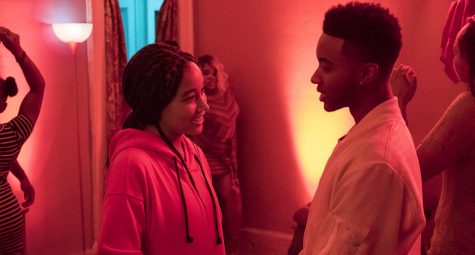Starr Carter discovers her voice in ‘The Hate U Give’
“Now when it happens, don’t act mad,” says Maverick Carter to his three children.
This flashback in the widely acclaimed “The Hate U Give” depicts a black father giving protagonist Starr Carter, along with her two brothers, Seven and Sakani Carter, the talk — he schools them on how to survive a routine traffic stop. The opening scene catapults viewers into a heart wrenching, raw story about a teenager, Khalil Harris, who loses his life to all-too-common police brutality.
The adaptation of Angie Thomas’s best-selling young adult novel follows Starr as she navigates between two deliberately separated worlds. A child from the poverty-stricken and predominantly black community, Garden Heights, Starr attends a private and mostly white high school called Williamson.
Starr’s observations about these two spheres of life define the beginning of the film. At school, she describes the social norm of middle and upper class white students assimilating to popular black culture. Starr is the only one who thinks twice about using slang words like “lit” and “trippin’,” which dominate the vocabularies of white, colorblind teenagers like her best friend Hailey and boyfriend Chris.

Starr Carter (Amandla Stenberg) connects with Khalil Harris (Algee Smith) at a house party in Garden Heights the night of the fatal shooting of Harris in “The Hate U Give,” the 2018 film adaptation of Angie Thomas’s 2017 young adult novel of the same name.
The privileged students openly immerse themselves in popular black culture to be “cool,” while Starr slightly refrains for fear of being labeled “hood.” This double standard remains apparent throughout the film, effectively putting what many people find to be a harmless cultural norm into question.
Yet at Garden Heights, Starr is criticized for not being “hood” enough — as her childhood friend, Kenya, put it, being too “basic.” Kenya makes fun of Starr as she proudly wears her favorite pair of Air Jordans to the house party where she reconnects with Khalil, one of her childhood best friends.
Starr’s navigation between these two worlds powerfully illustrates a comfortable environment that allows systemic racism to flourish. White students like Chris boldly claim everyone is equal in their eyes, no matter the color of their skin. However, in the aftermath of Khalil’s death at the expense of Officer 115’s racially charged mistake, the implications of the colorblind society that Starr lives in become evident.
I can feel Starr’s anxiety as soon as police sirens sound after she and Khalil leave the party together, largely thanks to Amandla Stenberg’s jaw dropping performance. With fear in her eyes, she first convinces Khalil to follow the instructions she received from her father during the talk — put your hands on the dashboard, do not talk disrespectfully to the officer, etc.
She holds this look of fear on her face with her hands glued to the dashboard, even as Khalil loosens up and grabs his hair brush through the driver seat window, an action which proves fatal. Stenberg’s acting made this violent moment more unsettling than I could have ever imagined.
I would say the acting performances were steller all around. Russell Hornsby is charismatic, protective and funny as he portrays Maverick Carter.
Following Starr’s trauma from witnessing Khalil’s death, we see Maverick waiting on the foot of her bed to console her as she is tormented by nightmares. A few scenes later, he switches to a concerned and defensive father, abruptly shutting down the King Lord’s threats not to expose Khalil’s involvement in selling drugs for him.
Personally, my favorite character was the eight-year-old Sakani, portrayed by TJ Wright. Sakani is a source of comic relief, as he playfully steals the last piece of bacon at breakfast that his parents demanded he leave for his grieving older sister.
Yet Sakani is more than a lively child. He represents the youth that bare witness to the ongoing violence and cyclical issues that are prevalent in many African-American communities throughout the United States.
Following Starr’s concealed appearance on television about Khalil’s murder, we see Sakani break down when the Carter family is eating dinner at a restaurant. As they lightheartedly pray and enjoy a family meal, the King Lord waits outside to confront Maverick about Starr speaking publicly on Khalil’s involvement in the drug business.
The police quickly interfere in the dispute and the King Lord speeds away. Maverick is relentlessly questioned and searched by officers, and eventually thrown on the ground and handcuffed as spectators record with their cell phones.
Sakani remains inside the restaurant and breaks down as he watches the abuse from the window. At this moment, we begin to see that the eight-year-old is a crucial piece to the Tupac Shakur metaphor the story is named after — The Hate U Give Little Infants Fucks Everybody (THUG LIFE).
Sakani is the “little infant” ingesting the hate in this story. We do not physically see Sakani much, especially compared to Starr, Maverick, Seven, Lisa Carter and most other characters in the film. But I think that is part of the overall message; we do not even realize that the cycle will continue unless something is done to break it.
The remainder of the story follows Starr as she gains the courage to publicly reveal herself as the eyewitness to Khalil’s murder. Several factors have hindered her ability to do so throughout the film, including her own trauma, her fear of being criticized by peers, the wrath of the King Lord and her mother’s concerns for her safety.
Despite these complex obstacles, Starr knows her voice is a powerful weapon in the pursuit of justice for Khalil and all those affected by police brutality. News reports about his death are filled with details focusing on who Khalil was, details about his impoverished family and anything else that might excuse officer 115’s assumptions and actions.
When she gets word of the officer’s acquittal, Starr and Seven join protesters at city hall, where Starr grabs a megaphone and identifies herself to the crowd.
Heavily armed police officers react violently to the protesters, resulting in a night of chaos that ends with Starr and Seven getting trapped in their father’s grocery store. The store is set ablaze by the King Lord, and the two teenagers narrowly escape the flames thanks to nearby store owners and Maverick’s swift actions.
As the King Lord approaches after the Carter children survive the fire, the eight-year-old Sakani joins the standoff, pointing a pistol at the drug lord who has been threatening the lives of his family members throughout the movie.
Police officers arrive and draw their weapons on the “little infant,” creating what I thought was the most tense and eye opening instance of the entire film. I saw the scene as a visual representation of Shakur’s THUG LIFE metaphor — society has given Sakani hate, and now he continues the cycle by enacting violence himself, affecting society as a whole.
Starr steps in front of Sakani, blocking him from the police officers and King Lord. I understood this action to be symbolic of what can start to break the cycle of systemic oppression, since Starr has grown to understand the power her voice yields throughout the story.
Altogether, “The Hate U Give” was spectacular. Starr could not have been a more captivating protagonist in a story that questions social norms and how they reinforce systemic inequalities.

Matthew Steinberg is a senior majoring in communication arts and double minoring in journalism in the public interest and Spanish. This year, he serves...







Ben Dover Biotch • Nov 21, 2019 at 11:25 am
THIS WEBSITE DOES NOT HELP ME! I’m looking for three times star uses her voice IN THE BOOK to change things.